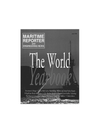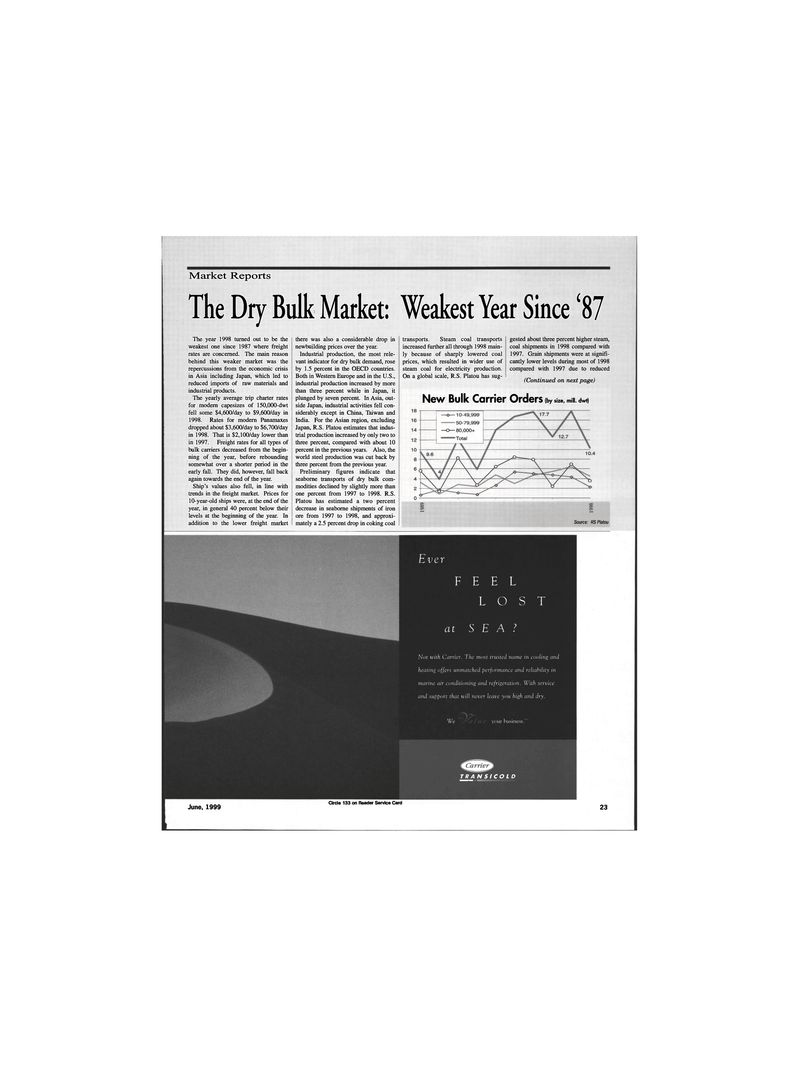
Page 23: of Maritime Reporter Magazine (June 1999)
Read this page in Pdf, Flash or Html5 edition of June 1999 Maritime Reporter Magazine
Market Reports
The Dry Bulk Market: Weakest Year Since '87
The year 1998 turned out to be the weakest one since 1987 where freight rates are concerned. The main reason behind this weaker market was the repercussions from the economic crisis in Asia including Japan, which led to reduced imports of raw materials and industrial products.
The yearly average trip charter rates for modern capesizes of 150,000-dwt fell some $4,600/day to $9,600/day in 1998. Rates for modern Panamaxes dropped about $3,600/day to $6,700/day in 1998. That is $2,100/day lower than in 1997. Freight rates for all types of bulk carriers decreased from the begin- ning of the year, before rebounding somewhat over a shorter period in the early fall. They did, however, fall back again towards the end of the year.
Ship's values also fell, in line with trends in the freight market. Prices for 10-year-old ships were, at the end of the year, in general 40 percent below their levels at the beginning of the year. In addition to the lower freight market there was also a considerable drop in newbuilding prices over the year.
Industrial production, the most rele- vant indicator for dry bulk demand, rose by 1.5 percent in the OECD countries.
Both in Western Europe and in the U.S., industrial production increased by more than three percent while in Japan, it plunged by seven percent. In Asia, out- side Japan, industrial activities fell con- siderably except in China, Taiwan and
India. For the Asian region, excluding
Japan, R.S. Platou estimates that indus- trial production increased by only two to three percent, compared with about 10 percent in the previous years. Also, the world steel production was cut back by three percent from the previous year.
Preliminary figures indicate that seaborne transports of dry bulk com- modities declined by slightly more than one percent from 1997 to 1998. R.S.
Platou has estimated a two percent decrease in seaborne shipments of iron ore from 1997 to 1998, and approxi- mately a 2.5 percent drop in coking coal transports. Steam coal transports increased further all through 1998 main- ly because of sharply lowered coal prices, which resulted in wider use of steam coal for electricity production.
On a global scale, R.S. Platou has sug- gested about three percent higher steam, coal shipments in 1998 compared with 1997. Grain shipments were at signifi- cantly lower levels during most of 1998 compared with 1997 due to reduced (Continued on next page)
New Bulk Carrier Orders (by size, mill, dwt)
Source: RS Platou
Ever
FEEL
LOST at SEA ?
Not with Carrier. The most trusted name in cooling and heating offers unmatched performance and reliability in marine air conditioning and refrigeration. With service and support that will never leave you high and dry.
We your business/'
TRANS/COLD
BKSSSSft':.-
June, 1999 Circle 133 on Reader Service Card 23

 22
22

 24
24
